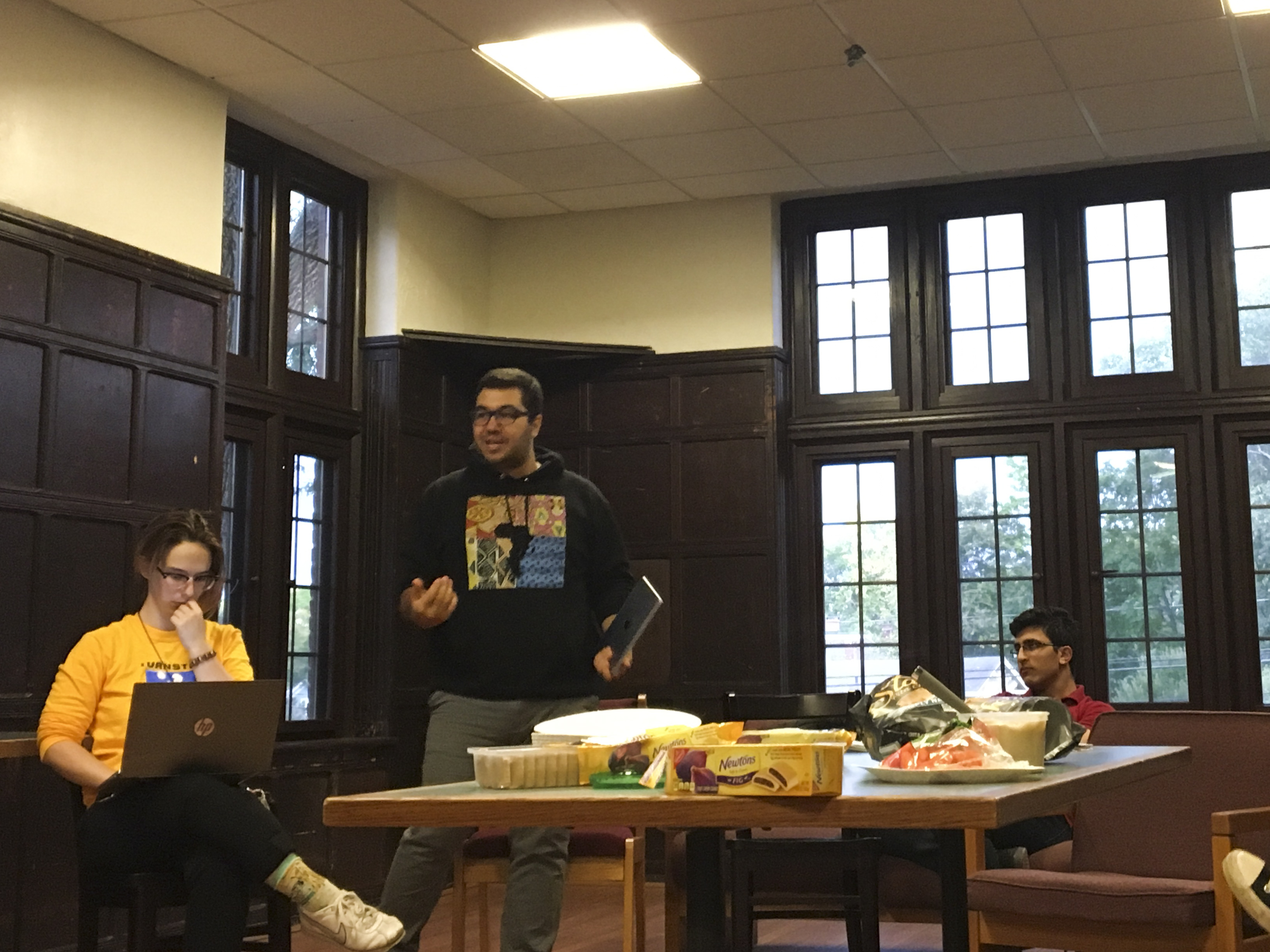
Spencer Dean, Contributing Writer
On Wednesday, Oct. 8, student organizers from Wesleyan Students for Justice in Palestine (SJP) and Wesleyan Jewish Voice for Peace (JVP) convened in 200 Church as co-hosts of a Palestine 101 information session. The event was advertised to community members seeking to learn about and support Palestinian liberation and human rights.
An initial Palestine 101 event, which featured a discussion led by Chair of the American Studies Department and Professor of American Studies & Anthropology J. Kēhaulani Kauanui, was held by SJP on Sept. 19. As this event landed on the Jewish holiday of Yom Kippur, organizers scheduled the additional Oct. 8 event to accommodate more students.
“We decided that the need was great enough—because we had missed a whole group of people who were observing—to do a second one and to hopefully reach out to people who couldn’t make it to the first one and to continue to be a more active presence on campus,” SJP member Dani Jewell-Tyrcha ’21 said.
Jewell-Tyrcha said that the first event may have been slightly more well-attended, in part perhaps because of the draw of Kauanui.
“She’s very, very well-versed and very knowledgeable on issues of colonialism and white supremacy,” Jewell-Tyrcha said. “[She’s] also very knowledgeable on Israel-Palestine issues as well.”
Through a slideshow presentation, an informational video, and a discussion activity, the event on Wednesday provided attendees with an introduction to the SJP and JVP groups as well as a general overview of the ongoing struggle between Israel and Palestine.
The scope of the presenters’ historical review began with May 14, 1948, when the Israeli Declaration of Independence was proclaimed. The presenters highlighted that the following day, May 15, is called Nakba Day by Palestinians. Nakba Day commemorates the mass exodus of 700,000 Palestinian people, who either fled or were expelled from their homes preceding and following the declaration. The students also outlined the Six-Day War of 1967 and this year’s Great March of Return.
Several students stressed the significance of vocabulary choice with regards to Israel and Palestine’s history. One interactive exercise led by the group instructed attendees to discuss with those sitting next to them the definitions of words such as colonialism, apartheid, and Zionism. The group contended that one common mischaracterization of the situation arises from labeling it as a conflict.
“The violence between Israelis and Palestinians is often falsely presented as a conflict between two sides with irreconcilable claims to one piece of land,” states a pamphlet printed by Wesleyan SJP. “In reality, this is a conflict over territory between a nation-state, Israel, with one of the world’s most powerful and well-funded militaries, and an indigenous population of Palestinians that has been occupied, displaced, and exiled for decades.”
Part of SJP’s mission statement, according to the group’s Facebook page, is to raise awareness and provide students with an alternative resource of information to the mainstream media.
“We hold a lot of educational events,” SJP member Indigo Cochran ’21 said. “Education is a big goal of ours.”
In addition to holding educational events, SJP and JVP also work on more direct activism tactics. For example, students spoke about the controversial Boycott, Divest, and Sanctions (BDS) campaign, which promotes various forms of boycott in order to put pressure on Israel. One instance of such activism occurred in 2017, when SJP activists at the University coordinated an effort to boycott Sabra hummus on campus as a BDS strategy.
“We do a combination of organizing, sometimes related to pressuring the administration, including BDS,” Cochran said.
Some of those in attendance at the Oct. 8 event were also members of JVP. Presenters commented on the coalition work being pursued by the two groups, which share some of the same goals.
“People in JVP are really great collaborators because they come from a very unique perspective in that their ties to the Jewish community are still very strong and their Jewish identity is generally still very strong as well, but they’re very knowledgeable in a side of the issue that a lot of people in SJP aren’t,” Jewell-Tyrcha said. “Being pro-Palestine and anti-Zionist while being Jewish is a hard identity to have, and so I think our collaboration stems from having a lot of the same passions and interests and care for Palestinian liberation but coming from different kind of perspectives and histories and backgrounds on it.”
Spencer Dean can be reached at srdean@wesleyan.edu.